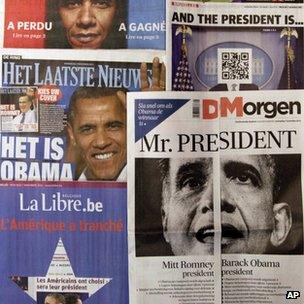Four more years of what?
- Published

Newspapers in Brussels, Belgium, tell the story of US election night
There was one instant when the Chicago crowd realised that four more years was no longer a slogan - that they had won.
I recall a woman at the front of the crowd - it would be insufficient to describe the expression on her face as "joy". Her eyes widened in disbelief that the moment had really come.
It looked as though her body couldn't contain her emotions. She was jumping and shouting as if to stop herself bursting with relief.
Crying and shouting and dancing, the crowd was not just celebrating the victory of one political party over another - it was the sheer ecstasy that comes after waiting by a sick bed until a patient makes a miraculous recovery - the man who embodied their dreams had survived; hope had not died.
The president milked the moment as he walked on stage with his family, to music and cheers from the crowd. He seemed in no hurry to get to the podium, smiling, waving, pointing as though he'd recognised a friend.
Vote for status quo?
They all want to be his friend. One of his daughters endearingly reached up to pat his back. No-one can blame him for wanting to savour this moment of triumph. But the chants of four more years prompt the question: "Four more years of what?"
The cold reality is, there is the danger for the man who promises change that nothing has changed. The president has been re-elected with a fresh mandate.
But guess what? The Republican House of Representatives, or part of it, has also been re-elected with a fresh mandate. The Democratic Senate has been re-elected with a fresh mandate.
So the people have spoken, and they have voted for the very system that stopped anything happening for the last two years. It is a three-legged race with the runners struggling to go their own sweet way, while bound together by heavy chains.
There will be a lot of talk of the fiscal cliff - the mutually agreed suicide pact that was meant to concentrate minds on agreement.
Unless they do, the Democrats will be hit by spending cuts they don't want and the Republicans saddled with tax rises plus defence cuts that are abhorrent to them. Still chained on the edge, they seem determined to jump off the cliff, wrapped in an ugly embrace.
But the fiscal cliff is just one example of where the president may find it difficult to move forward. It's not easy to achieve reform of the tax code, spending on infrastructure, and progress on green energy.
And his partners may be locked in a struggle of their own. For Republicans, defeat may be followed by a healthy debate. Or it may be political civil war.
It is inevitable that Mitt Romney will be blamed as a poor candidate - he was, although he deserves high marks for evolving into something much better and upping his game.
Conservatives will say they weren't right-wing enough. Moderates will say they have to move to the centre.
A really good conservative analysis comes from Red State, external and one line from this Tea Party blog stands out: "The Romney campaign (attitude) to the Hispanic community was atrocious and, frankly, the fastest growing demographic in America isn't going to vote for a party that sounds like it hates brown people."
It is just possible that immigration reform may be the president's best path forward. As Mr Obama stood amid the red, white and blue ticker tape with his family, it was a moment to drink in the rapture of the crowd.
He won the popular vote by a narrow margin. He has promised to learn, to govern for all of America, but to some in the crowd that would look like betrayal. His first victory ensured his place in the history books.
He will have earned it, if his second election victory means he can find a way to build a bridge between two Americas.